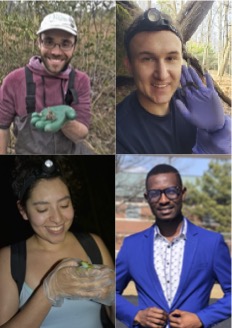
The 2024 recipients of the CBCR Summer Graduate Student Research Grants are (clockwise, starting top left): Patrick Allison Jr., Jakub Zegar, Boluwatife S. Olubusoye, and Sara Lucia Anaya Morales.
The summer research of Patrick Allison Jr., involves the collection of “four complementary data types” to achieve the goals of his project entitled “Discovery, Delimitation, and Conservation of Creaserinus Burrowing Crayfish Species”. He notes that “Crayfish are functionally important ecological service providers…and the southeastern US is the globally renowned center of [crayfish] diversity and endemism.” His proposal focuses on four species that are of “High” or “Highest” Conservation Concern in Alabama, Louisiana, and/or Mississippi. In contrast, the work of Sara Lucia Anaya Morales, “Unraveling the Roles of Behavioral Thermoregulation and Immune Function in Amphibian Disease Resilience”, relies on a species of least conservation concern, the American bullfrog, as an experimental model to understand how some amphibian species have been able to show signs of recovery to a fungal pathogen that has decimated amphibian populations worldwide. Her integrative research examines “the interplay of immune defense mechanisms and behavioral thermoregulation” in determining resilience to disease. Jakub Zegar is also studying amphibians for his research “Understanding the Effects of Climate Change on Amphibian Performance in the Face of Disease”. He will measure the microclimate (that is, temperature and humidity) experienced by amphibians in the field, as well as amphibian movement performance at different temperatures. These data will allow him to be able to construct models that predict where populations of amphibians are likely to persist and thrive under future climate scenarios. He points out that “This approach aligns closely with the goals of the CBCR by providing crucial insights into the threats facing endangered taxa and informing conservation strategies to mitigate these challenges.” Boluwatife S. Olubusoye’s proposal “Microplastics and Tire Wear Particles in Stormwater Runoff in Oxford, Mississippi: Toward Mitigating Impacts on Aquatic Ecosystems” describes the global threat posed by plastic pollution. He states “Stormwater runoff is a major pathway for these pollutants to enter aquatic ecosystems where they may impact vulnerable species” and suggests that “biochar”, a unique form of charcoal, may be a cost-effective solution to capture harmful microplastics and their associated toxins before they can be transported to streams, rivers and other waterbodies.
“By connecting University of Mississippi students to the Center through the student affiliate program, we create opportunities for them to find research mentors, become familiar with issues and methodologies of biodiversity conservation, and enhance interactions among peers with common interests in conservation.” says Dr. Richard Buchholz, Director of CBCR. “With the support of faculty and professional affiliate members of the Center for Biodiversity & Conservation Research (CBCR) at the University of Mississippi, and Dr. Sixue Chen, Chair of the Department of Biology, we are able to provide the resources and training opportunities that will position these graduate students on the cutting edge of efforts to protect vulnerable species and improve environmental quality for humans and wild organisms alike.”
To support CBCR’s efforts to train students, charitable contributions can be made to the Biodiversity & Conservation Research Fund